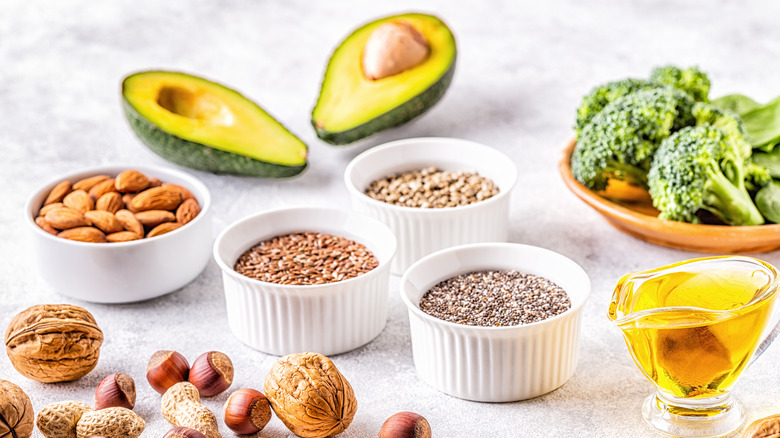Fishy Myths You Need To Stop Believing About Omega-3s
Docosahexaenoic acid (DHA) and eicosapentaenoic acid (EPA), the two most common omega-3 fatty acids, occur naturally in seafood and fatty fish, such as tuna, salmon, sardines, and mackerel. Fish oil and other dietary supplements contain these compounds, too.
Alpha-linolenic acid (ALA), on the other hand, occurs in plant-based foods, like flaxseed oil, nuts, and chia seeds. "Your body has to convert ALA acids to DHA and EPA, and that process isn't always the most efficient, as it can change from person to person," dietitian Anna Taylor told the Cleveland Clinic.
These fatty acids support cardiovascular function and immunity, explains the National Institutes of Health. But as with most things, there's a lot of misinformation regarding their role in human health.
Fish oil and other supplements rich in omega-3s are promoted as a cure-all. These nutrients may help relieve arthritis pain and lower the risk of stroke, but they can't prevent or cure diseases, says the National Center for Complementary and Integrative Health (NCCIH). What's more, their health benefits are questionable. For example, some studies suggest that omega-3s may help with depression, while others show no benefit.
Listed below are some of the common myths about omega-3s.
Omega-3 supplements can prevent heart disease
Research shows that omega-3s may reduce the risk of stroke and heart disease, among other benefits. Based on these findings, health organizations recommend eating a diet rich in healthy fats to help prevent heart disease, per American Heart Association.
However, studies on supplements have had mixed results, according to Harvard Medical School. For example, a 2018 review published in JAMA Cardiology found that omega-3 supplements have little or no effect on the risk of stroke, heart disease, and other vascular events. The results were based on 10 clinical trials conducted on nearly 78,000 men and women prone to cardiovascular problems.
High omega-3 intakes could actually make things worse for those with heart disease and elevated triglycerides, suggests a 2021 review featured in the European Heart Journal — Cardiovascular Pharmacotherapy. After analyzing five different studies, researchers concluded omega-3 supplements may increase the risk of atrial fibrillation, or irregular heartbeat, in this population. Atrial fibrillation is a major risk factor for stroke, high blood pressure, and heart disease, explains the Mayo Clinic.
Omega-3 supplements are likely safe for healthy people, but they may not prevent heart disease. The experts at Harvard Medical School say that it's best to get omega-3s from food rather than pills. Cardiovascular disease risk appears to be lower in those who eat seafood up to four times a week, reports the NCCIH.
Fish oil boosts brainpower
It has been thought that omega-3s can improve memory and brain function. In fact, some studies have linked these nutrients to a lower risk of cognitive decline and neurodegenerative illnesses, such as Alzheimer's disease, says the NIH. Scientists believe that DHA, a type of omega-3 fatty acid, helps preserve neuronal function and brain volume, but the research is mixed.
A large-scale study investigated the effects of omega-3s on cognitive function in older people at risk of age-related macular degeneration (AMD), an eye disease that affects vision. Some of the study participants took omega-3 supplements along with lutein and zeaxanthin, two antioxidants that protect eye health and may help treat cognitive impairment. All subjects followed the treatment for five years. Unfortunately, neither supplement caused significant improvements in cognitive performance. However, researchers say that eating foods rich in omega-3s rather than popping pills may have beneficial effects. These findings were published in JAMA in 2015.
Dr. Emily Chew, the lead researcher who conducted the study, told Time that supplements cannot replace a balanced diet. "You are what you eat, and you've got to eat well. Maybe it was too late for some of the people in our study." She also said that fish oil may not be necessary at all for people who eat fish, fruits, and vegetables regularly. "The overall dietary pattern is more important than a single nutrient," explains Dr. Chew.
Fish oil may cause bleeding
You might have heard that fish oil, one of the main sources of omega-3s, can thin your blood and increase bleeding risk. That's not entirely false, but it usually happens when fish oil is consumed in large amounts, per Mayo Clinic. For example, a 1990 study published in the Journal of Pediatrics found that fish oil may cause nosebleeds in teenagers and young people. However, there's not enough evidence to confirm these findings.
In a 2018 clinical trial, researchers assessed the effects of fish oil on 1,516 patients waiting for surgery. One group took 8 to 10 grams daily for two to five days prior to surgery, and lowered the dosage to 2 grams per day after the procedure. The other group received a placebo. The risk of bleeding was similar in both groups. Fish oil also reduced the need for blood transfusions, reports the journal Circulation: Cardiovascular Quality and Outcomes.
Everyone should take omega-3 supplements
The Linus Pauling Institute recommends 1.1 grams of omega-3s per day for women over 14 years old and 1.6 grams per day for men in the same age group. If you're pregnant, try to get around 1.4 grams a day. These recommendations refer only to ALA, an omega-3 fatty acid that cannot be produced by the body. After ingestion, ALA is converted to EPA and DHA. Researchers also explain that low intakes of fatty acids may lead to skin problems, impaired immune function, slow wound healing, and other health problems. But even so, not everyone needs to take omega-3 supplements, said Dr. Pieter Cohen in an interview with The New York Times.
Many people mistakenly believe that omega-3s can compensate for bad eating. "That's really misguided because in this case, we have absolutely no evidence that replacing a healthy meal of fish with an omega-3 supplement is better," notes Dr. Cohen. He also warns that dietary supplements are not regulated, making it difficult to assess their safety and efficacy.
Your best bet is to get these nutrients from foods such as walnuts, herring, salmon, and chia seeds. Flaxseed oil, for example, provides 7.26 grams of ALA per tablespoon, according to the NIH. That's more than six times the daily recommended intake for adult women!
Plant-based omega-3s are of lower quality
If you're a vegan or vegetarian, you may be concerned that you're not getting enough omega-3s. Fish is chock-full of healthy fats, but you can also obtain these nutrients from plant-based foods. Nuts, seeds, and certain oils boast large doses of ALA. The downside is that only 30% of the amount ingested is absorbed into the body, reports a 2019 review featured in the journal Molecules. However, you only need 1.1 to 1.4 grams of ALA per day — and that's something you can achieve simply by eating a balanced diet.
ALA has lower bioavailability than DHA and EPA, but this doesn't mean it's inferior. On the contrary, it may lower the risk of heart disease by 10% and the risk of cardiovascular mortality by a whopping 20%, according to 2022 research published in Advances in Nutrition. What's more, this nutrient may protect against diabetes, but further studies are needed to confirm these findings.
With that in mind, make sure your diet includes pumpkin seeds, flaxseeds, olive oil, and soybeans. Fill up on walnuts, too, as they may help protect against heart disease and all-cause mortality, suggests a 2021 review featured in the BMJ.






